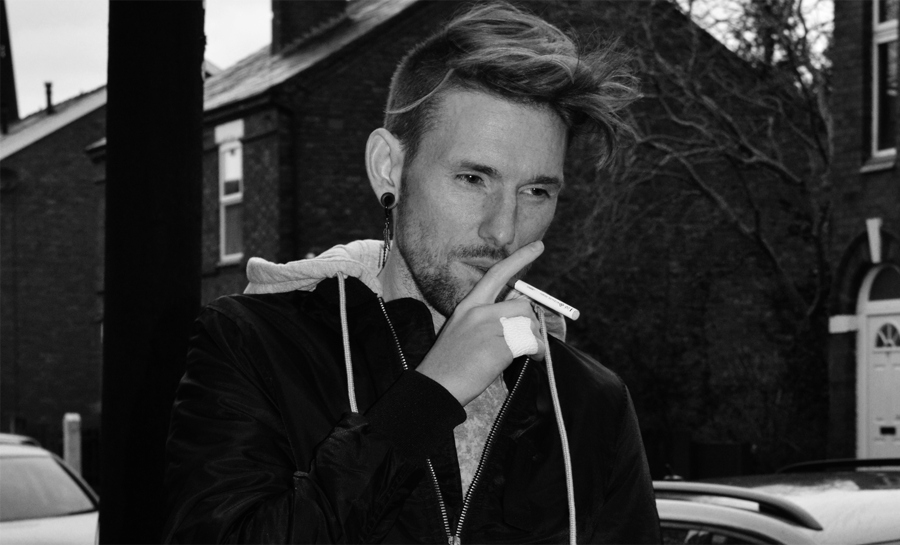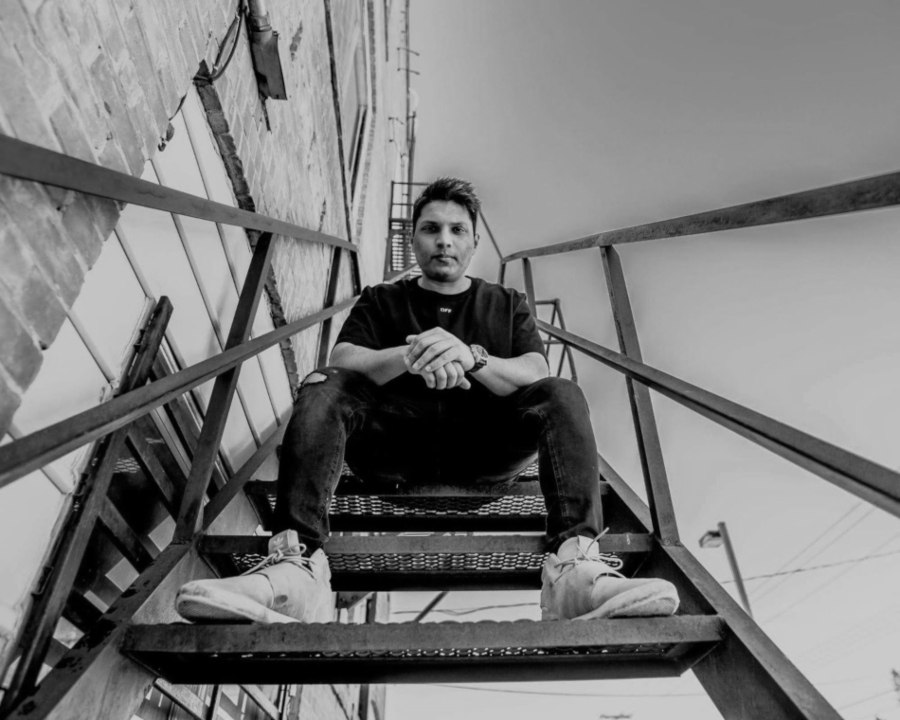Interview: Five minutes with Jamila & The Other Heroes
Jamila & The Other Heroes are a five-piece fellowship from Berlin. Fusing influences from the Middle East, Latin America and Eastern Europe, their psychedelic desert-funk sound is rooted in the band’s many influences. Their latest track, ‘Aliens In My Bed‘ is a perfect example of these fusions, having been released last week and marking the approach of their upcoming album, Sit El Kon (The Grandmother of the Universe).
Having studied Politics and History in London, with a focus on the Middle East, the lead singer Jamila Al-Yousef champions both the activist and the humorous aspects of life. Having been born on the day the Berlin wall came down, her parents knew she was destined to make great things happen from the start.
We had a chance to sit down with Jamila and talk about all things music.
Set the tone for us. Why the arts?
I never found that much freedom, therapy, strength and acceptance elsewhere. After being born in Berlin (the day the wall came down;), my parents moved for work to a small town in East Germany. I never felt so much not-belonging. I was bullied for my name and Arab background. For my otherness as a city kid, for the openness I learned at home and from being privileged to travel the world since the age of 1 with my parents to visit our family in the Middle East and discover other parts of the planet.
I escaped into the arts to digest these feelings of otherness/non-belonging, and I found a home in writing poems, songs, dancing, playing theatre and learning different instruments at the local music school (singing, drums, guitar, piano).
At the age of 14, I approached the mayor of that town (Güstrow) with the wish to organize a youth festival against racism and to give a stage to young people that barely had any creative spaces in that small town. The festival took place 5 times and you could see how more and more youth bands formed to play on stage, and how many young people wanted to be involved on the organizational side – so in the Arts I found a space to connect with people who before were sceptical about me, and break out of the isolation/ the not-belonging that beforehand I dealt with through artistic means.
Today I can travel anywhere and feel connected by jamming with strangers and touching people that listen – and often these people become friends – something we also experienced with the whole band on our tours. Having a musical home, wherever we go.
Coz together we create an atmosphere of home and acceptance. And also we can create space to address socio-political injustice through our arts. That’s the gift of making music to me.
Which comes first when you’re producing – the sound or the idea?
Usually, I have a melodic afflatus and I just record it on my phone as a sound memory. In the days after I sit at the piano and experiment with chords around that melody. Usually, by then an idea of the feelings/ topics around it becomes more clear. Then I take these fragments to the rehearsal room and together with Leon, Kuba, Bilal and Salam we build the complete song – whether it’s just adding other colours to the chords or an unexpected rhythm/ guitar and bass riff or completely new parts.
With the latest song I wrote – ‘Aliens in my Bed’ – I had a special experience. I met with fellow singer colleagues and friends Alin Coen and Dota Kehr for a writing session. A mindmap technique lead me to the idea of the title ‘Aliens in my Bed.’
A few weeks later we had an incredibly beautiful gig at Fusion Festival. I lost my phone and had an emotional discussion with yet another lover afraid of feelings and falling out of my life quicker than deepening our falling in love. Later under the shower, I felt my anger and sadness about this reproduction of heteronormative gender cliches (both being excited about spending time and opening up, the woman interested in building a partnership, the man being afraid of feelings and pulling back after a first romantic phase). While showering I unconsciously composed the first verse and bridge of ‘Aliens in my Bed’ including the lyrics. I couldn’t record it due to my lost phone so I sang it around 30 times to myself before going to bed and luckily remembered it the next morning.
Does your material feature any collaborations?
Oh yes! We love collaborations, we love the music community we created in our Berlin Neukölln circles. We have a beautiful vocal feature with Brazilian singer Danilo Timm (on the song ‘Fight Club’) and with his international Heart Choir (on the songs ‘Farashat’ and ‘Khalas! The Umbilical Chord’).
I (Jamila) always dreamed of producing an album with a choir and it makes the beginning and the end of our CD just epic! Also, we have onboard our dear friends Roland Satterwhite (US), known by his band TOLYQYN and DJANGO LASSI, playing the violin (on the song Sit El Kon), and Syrian trumpet virtuoso Milad Khawam (playing a psychedelic solo on ‘Abu Dub’). My wonderful friend Naima Husseini – a musician and producer – worked on the vocal editing and did creative consultation as well as Danilo and Roland. They came to our rehearsals, listened to the arrangements with us, were in the studio and sharing their thoughts and ideas.
What’s on your current playlist?
I just created a playlist for the cold autumn days called Smooth Sunday including tracks by some of my favourite acts such as Kokoroko, Quantic and Alice Russel, Nai Palm/ Hiatus Kaiyote, Yusef Lateef, Pink Freud, Yasmine Hamdan, Matthew Halsall, Alsarah & The Nubatones, Altin Gün, Khruangbin, Nick Drake and Kate Tempest.
In our band collective we share a passion for rock music from our youth. We all love Led Zeppelin but on our tour radio, we also love to listen to heavy Hip-Hop Beats and global grooves from all over the World.
Tell us about the chemistry you have with your fans on stage.
We feel a fiery feedback loop – when the room is packed and people dance and sing along, we also get wilder, which makes the audience even more explosive and the feedback circle continues. In that volcano of energy we also create moments to calm down in between and fly on the sounds of a psychedelic guitar solo or a poetic Arab Mawwal.
I also really love when people start singing along like in our song ‘Khalas! The Umbilical Chord’ that has a part where only we and the audience sing acapella in between two heavy rock parts and just slowly the Qarqaba, bass and other instruments come back in.
Our fans describe how much they love our dynamic; and the diversity in style and language and feelings, the transgalactic journey we take them on.
I am extremely touched when people can identify with the narratives of my lyrics – that’s my job as a songwriter, that people can find themselves in my texts.
What techniques do you experiment with to get your original sound?
It just comes naturally to us to jam and bring our experiences from other bands, sessions and the music we listen to into the band. We never really rationally think we wanna go to this or that direction – it just happens in the flow and from our live experience. We organically built this sound together in the past 3 years.
Take us through a day in the recording studio.
We drive with Leon’s old and wildly painted car through Berlin from Neukölln to Weissensee to arrive at Richard’s and Nene’s Big Snuff Studio. Richard runs down to open the door, half a staircase up and there they are: all those treasures the two sound engineers collected over the years. Gear from the 60s, 70s and 80s (such as a 16 Track Otari tape machine, a Siemens WSW mixing console, a Moog synthesizer, a Supro guitar amp also Led Zeppelin used to record on and a Telefunken Echomixer for crazy voice effects).
You feel the magic just by being in the room with all this precious equipment that has experienced so many stories.
After arriving we make some tea and coffee, sit on the leather sofa in the red-painted room with the old mixing console and discuss the plan for the day. Then we head to the recording room. The rhythm section records and Jamila sings guide vocals. Friends like Roland Satterwhite, Danilo Timm or Naima Husseini are there and give us feedback. Later we have lunch at MOON – the best Vietnamese restaurant. We continue recording till late at night with passionate discussion during listening sessions.
After the rhythm section was recorded (which only took 2 days) we mostly weren’t all together in the studio at the same time but in shifts for overdubbing – and Jamila came in every day for producing our feature acts and for the mixing process with Richard Behrens.
We were in the studio in two phases: the beginning of June, when it was 35° sweating like waterfalls (and there was no air condition installed yet), and in October, when it suddenly dropped down to 3°. We kind of felt all the seasons and this is how diverse also our music sounds…
Was there a specific moment in your life where you thought, “this is what I want to do”?
I don‘t remember when it started, already as a child – I used to perform at Mini Playback Shows in our family holidays in Mallorca or Crete, I did songs like „it’s raining men“ or „genie in a bottle“ by Christina Aguilera. Although it was playback I always sang along. First I wanted to become a musical singer & dancer. But also I saw myself in other jobs, I always had very good marks in school and everyone expected me to become a doctor like my parents or at least go into world politics or UN or so.
In whatever phase of my life, I always wrote songs and performed, even quit my politics and history BA at SOAS in London (2009/10) to study music at LCCM, but I never really focused on music only – I think I was too afraid to go all in and still interested in many other things like cultural sciences. Also my parents – who always supported me in making music – at the same time were really against me becoming a musician/ making music my career.
Also I never wanted to be depending on earning money with what I love so much. So I always worked in cultural projects close to music such as curating the Arab* Underground program at Fusion Festival and in the Berlin club scene (to make the diversity of perspectives from the Middle East and North Africa visible through all forms of arts, talks and workshops) for many years and building up a Welcome Board for refugee musicians for the Ministry of Arts and Science in Lower Saxony.
Parallel to that job I formed my band Jamila & The Other Heroes in 2016. Due to the heaviness of the political situation for refugees in Germany – and my limited means to support them the way I felt was right; do something with meaning and in the frame of my political aspirations – I got a heavy burn out that lasted for a couple of months. I was sick all the time, feeling overwhelmed and guilty for having so much power in my hands over the lives of wonderful people who don’t have the same access and rights as I do. I never felt so much pain about my own privileges – at the same time, I also experienced racism in that job. One day a man called asking how my name could be Al-Yousef if I had such a light-skinned, friendly face as he sees on our website. And then he said that I must have already been living a couple of years in Germany coz I would be speaking German quite well already (he didn‘t take the time to read my bio in which I wrote my dad is from Palestine and my mum from Germany, where I was born). Next, he asked if I could organize him some belly dancers to integrate the refugees in an opera project and into his town- that kind of exotism probably didn‘t have a mean intention, and yet was very paternalistic and insulting to the refugee musicians who had very diverse qualifications and knowledge.
During that burn out I decided that I had to go to Cuba and travel (for the first time since I am working on cultural projects) without my laptop and really just be in the moment of that journey. There I decided to quit the job and focus more on music.
But I didn’t know how to make a living like that, so first I still had a plan B which was applying (and actually soon after receiving) a scholarship to write a PHD on the situation of refugee musicians in Germany – trying to do that for a year while simultaneously making more and more music with my band, I experienced a second burn out due to the imagined societal and family expectations, and finally decided in summer 2018 to get out of all these societal dependency structures and create as much free space as possible.
First I was struggling financially, doing little jobs here and there, like working in a theatre and starting my weekly concert series in a venue in Neukölln (Thursdays Live in Rixdorf at Rotbart) – but that way I finally focused on our band project more than ever before, also with big help of Rainer Scheerer who firstly believed in our music and secondly advised us in the beginning, helped us to get a booking agency (Black Forest Voodoo) and later became our publisher, manager and label (Springstoff). Luckily I meanwhile found a niche and started giving a few days each month workshops on racism critical cultural work for elite cultural institutions all over the country, but also for free arts collectives, as well as teaching a course on that topic at the University of Hildesheim – this finally gave me the freedom to really focus on music and make this debut album become reality. I installed a crowdfunding campaign and also wrote funding applications – with the help of German governmental funding by Initiative Musik we now can afford all that beautiful album-making process.
What do you keep close by while you’re playing a set?
– We transform into heroes on stage, so our hero outfits, glitter and makeup are an integral part
– We drink mate, sage tea and water on stage
– Kuba always puts his purse on the snare to have a nicer sound
– Jamila loves to bring well-prepared setlists including whom not to forget to say thank you to
– And the greatest pleasure is having good friends in the audience who send us their unconditional love
Any emerging artists on your radar?
I just booked Alien Grace to my weekly Rotbart concert series and they opened for us last week at Artistania (our musical home in Berlin). They are so young and so gifted. Insane! Elias, the front singer and composer wrote to our FB page coz he liked our music and suggested opening for us and I was directly excited to book them!
Alien Grace is a six-piece fusion project revolving around the piano-based songwriting of frontman Elias Graversen. The music is tainted by his Bolivian heritage, as well as his love for Balkan folk, Gospel, Soul, and a bit of Rock n’ Roll. The band members come from Norway, Sweden, Malta, Lithuania, Denmark, Bulgria and Bolivia.
What gets your creative juices flowing?
Travelling, getting inspired outside the comfort zone, meeting new people, sensual and spiritual experiences (like rebirth breathing), jam sessions and going to live concerts.
Also trying to digest heavy emotions often leads into creating music that for all of us is like a Group Therapy.
Take us through your collection of gear, tech or software that accompanies your creative expression.
Since we unite sounds of different cultures and eras in our style we are always searching for gear that allows us to create futuristic sounds from the past. Our guitar sound with a typical Fender Strat from the 70’s on a Fender Twin and a bunch of analogue and digital effects builds a bridge between retro rock and new Psychedelica. Also in the Studio we are more classical: The master of the recording ran through Tape and all the gear we used on our album is analogue. From a 70s Moog Synthesizer to a Supro guitar Amp that among others Led Zeppelin used on Recordings. Apart from the gear it’s always the style of how you play on and with it. Kuba‘s drum play, for example, varies between hard rock rhythms and neo Soul / Hip hop beats that he transfers on a physical drum set while other producers use drum machines or software.
Any side projects you’re working on?
– Jamila (vocalist): see above (workshops/ university teachings on Racism Critical Cultural Work; weekly curation of concert series; formerly festival curation like Arab* Underground, BERLiSTANBUL, here and there conceptualizing or sitting as a speaker on panels on music and cultural policy)
– Kuba Gudz (drummer) plays in other awesome bands (we are like a big music family) such as TOLYQYN, Shishko Disco and Hektisch Kunst
– Leon Sánchez (guitarist) has a music and sound rental agency and plays as DJ Bouillabaisse, spinning the finest records from Afrofunk/Latin/60s70s psychedelic rock…
– Salam Alhassan (percussionist) also plays music with Milad Khawam and by profession is a fine artists, focusing on illustration (he did the artwork of our EP and stickers)
– Bilal Hammour (bassist) is a full time musician and still finishing his studies at the Jazz Institute Berlin
How have you refined your craft since you entered the industry?
Compared to our 2017 EP our style and sound have become much more clear.
Breakdown the news for us: what can we expect from you next year?
In 2020 we wanna go on our first club tour in Germany; play more and bigger festival stages here; go again to the Middle East but new places like performing at the Beirut & Beyond Showcase Festival, being played on the radio; hit more Spotify and Apple Music playlist (we already got selected for 3 on Spotify Editorial playlists and one on Apple music with our single ABU DUB); expand more internationally and play shows in the UK, France, explore international showcases lile WOMEX, Midem, Reeperbahn Festival, Visa for Music.
Famous last words?
If I can‘t dance, it‘s not my revolution (Emma Goldmann/ Ece Temelkuran)
Follow Jamila & The Other Heroes
Website – Facebook – Twitter – Instagram – Soundcloud – Youtube – Spotify



